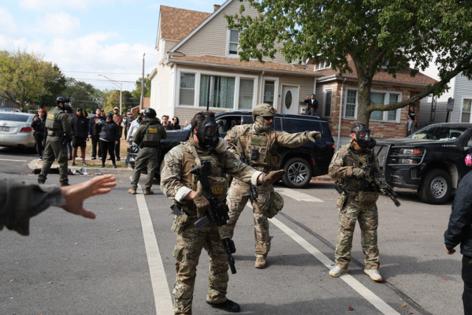Patricia Lopez: Bounty hunters? They're the last thing ICE would need
Published in Op Eds
The Department of Homeland Security appears to be considering a terrifying new escalation of its mass deportation campaign. The Intercept, a nonprofit investigative media outlet, has reported on and obtained DHS documents showing that the department is considering the use of bounty hunters, who would be paid to track and verify the locations of people the department seeks to arrest.
The department has not confirmed whether it is going ahead, but the idea is fraught with legal and moral problems that should prompt it to reconsider. Using bounty hunters to help deport people would only further break down the transparency expected in a democracy. And it would create additional fear and confusion at a time when many immigration agents — wearing neck buffs and civilian clothes — are already too hard to identify.
Minnesota Attorney General Keith Ellison told me that the Trump administration’s tactics “have already been shown as inhuman, abusive, generally unfair and offensive to standards of basic decency.” The possibility of introducing private bounty hunters into the mix, he said, “raises real legal questions about due process.”
In Minnesota, Ellison noted, bounty hunters are specifically prohibited from passing themselves off as law enforcement, or dressing like them. But what do you do, he said “when ICE agents already cover their faces, drag people into unmarked vans and are indistinguishable from street bandits?”
Bounty hunters already have a wild-and-woolly reputation. Many do their jobs well. But they are not government agents. They are bound mostly by the terms of their contracts with their employers. And that has resulted in problems.
In Nevada, where the use of bounty hunters is widespread, the state Department of Insurance in 2017 documented 459 pages of complaints about bounty-hunter abuses over a five-year period, including allegations of harassment, stalking and excessive force.
If DHS does turn to bounty-hunters, it would be one natural consequence of a department with both unrealistic deportation goals and far too much money: an infusion of $170 billion to be spent over the course of Trump’s term.
Immigration and Customs Enforcement and the US Border Patrol are now the best-funded law enforcement agencies in the country, with funds rivaling those of a small nation’s military. That has led to lavish advertising budgets, fleets of high-end Jeeps, $50,000 signing bonuses and contracts with private prisons. It also makes the department a tempting mark for every private contractor with a conceivable tie to immigration. According to a Brennan Center for Justice analysis, “The rush to spend money fast is likely to result in large amounts of funding flowing to private contractors, with pressure to cut corners.”
Enter the bounty hunters. Typically, bounty hunters are hired by bail bond companies to locate and capture individuals who fail to appear in court after posting bail. It is a lightly regulated industry; requirements vary greatly from state to state. Some states, such as Wisconsin and Illinois, ban their use entirely. It is unclear how a federal contract would be affected by state statutes or restrictions.
According to the DHS procurement document, obtained by The Intercept and known as a Request for Information, “ICE has an immediate need for Skip Tracing and Process Serving Services … to verify alien address information, confirm the new location of aliens and deliver materials/documents to aliens as appropriate.” The document asks potential vendors to indicate what “pricing structure” they’d recommend for “increments of 10,000 up to 1,000,000” detainees. (It may be an outgrowth of an earlier plan pitched in February, reported in Politico, that described an aggressive plan to use private armies to facilitate the deportation of 12 million individuals by the 2026 midterms.)
It appears the bounty hunters would not physically apprehend individuals, but rather report them to federal officials, although even that remains fuzzy. By law, private contractors are prohibited from arresting people — that power is reserved for law enforcement or federal agents.
But DHS has done little to inspire confidence that it would regulate what could be a small army of bounty hunters fanned out across the nation. Videos and court testimony have already contradicted DHS’ version of events. In issuing her injunction earlier this week to restrict agents’ behavior, US District Court Judge Sara Ellis noted that Border Patrol Chief Greg Bovino, the head of Chicago’s “Operation Midway Blitz,” had repeatedly said things that were untrue during his deposition.
Given all of this, even a proposal to use bounty hunters marks a chilling expansion of governmental reach in an agency whose performative aggression is fast outpacing the public’s tolerance.
This is an administration that prefers to push the envelope rather than follow standard rules and procedures. That could make its pairing with contracted bounty hunters working on commission, under pressure to make quotas, particularly disastrous.
____
This column reflects the personal views of the author and does not necessarily reflect the opinion of the editorial board or Bloomberg LP and its owners.
Patricia Lopez is a Bloomberg Opinion columnist covering politics and policy. She is a former member of the editorial board at the Minneapolis Star Tribune, where she also worked as a senior political editor and reporter.
©2025 Bloomberg L.P. Visit bloomberg.com/opinion. Distributed by Tribune Content Agency, LLC.
























































Comments